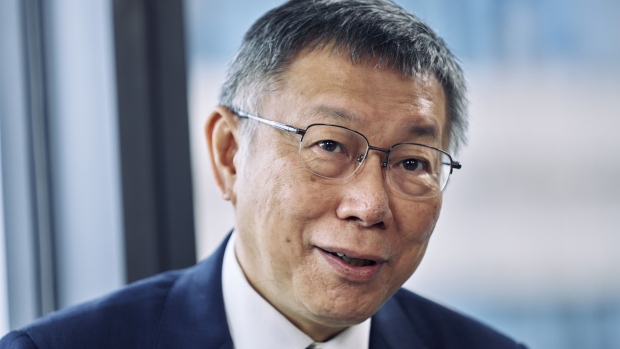Nov 15, 2023
Taiwan Candidate Says He Still Hates the Party He’ll Run With
, Bloomberg News

(Bloomberg) -- A top candidate for president in Taiwan says he still strongly dislikes the party he’s teaming up with, a comment that suggests the partnership reshaping the race may be a rocky one.
“I’m in a bad mood,” Ko Wen-je of the Taiwan People’s Party said at a campaign event Wednesday. “I hate the Kuomintang but I hate the Democratic Progressive Party even more.”
See: Taiwan Opposition Agrees to Joint Bid, Reshaping Election
Ko said in a TV interview later that concern about the risk of conflict with China convinced him to make the agreement, adding that “war is not impossible in Taiwan.” The deal surprised his aides, he said.
The blunt remarks came just hours after he agreed to cooperate with the Kuomintang in a bid to defeat the ruling party, which leads polls. With Taiwan at the forefront of fraught ties between Beijing and Washington, the election of a more China-friendly government in Taipei could remove a potential flashpoint between the world’s two economic superpowers.
The island came up in talks between President Joe Biden and Chinese leader Xi Jinping in California on Wednesday, with US officials saying they believe Xi indicated he wasn’t readying plans for a mass invasion. Biden asked the Chinese to respect the electoral process in the upcoming presidential vote, the officials said, speaking on condition of anonymity.
Investors in Taiwan assets appeared to take heart from the latest twist in the presidential race. The Taiex rose 0.3% to close at the highest since Aug. 1. The island’s currency climbed 0.3% to 32.01 versus the greenback, the strongest level in about two months.
More: Biden-Xi Meeting Delivers Small Wins and Promises of Better Ties
China has repeatedly pledged to bring Taiwan under its control someday, by force if necessary. It has held major military drills around the island twice since August 2022 because President Tsai Ing-wen met with senior US lawmakers. Tsai is unable to run in January because she has served the maximum two terms.
Biden has repeatedly said the US would defend the democracy of 23 million people if China attacks. Washington and Beijing are also at odds over the South China Sea, the body of water south of Taiwan that Beijing claims as its own. Both sides have recently accused the other’s military of provocative behavior there.
Also: Taiwanese Presidential Frontrunner Talks China, Chips, America
Vice President Lai Ching-te of the ruling Democratic Progressive Party has led opinion polls for much of the past year but a single opposition bid raises the likelihood of a government in Taipei that’s more willing to accept China’s conditions for direct talks between the two sides of the Taiwan Strait.
Lai led a poll released Wednesday by My Formosa, a private company whose founder is linked to the DPP, with the backing of 33.1% of respondents. Hou was second at 26.5%, and Ko third with 17.3% support. Foxconn Technology Group founder Terry Gou had the backing of 5% of respondents.
The alliance between the opposition parties raises doubts about the future of Gou’s presidential ambitions. For months, he publicly toyed with the idea of teaming up with Ko to revive his flagging campaign but the agreement appears to have blocked that avenue.
At a speech in Taipei on Thursday, Gou brushed off questions about his political future.
Ko, KMT candidate Hou Yu-ih, KMT Chairman Eric Chu and former President Ma Ying-jeou agreed to use the results of public and internal party polls conducted between Nov. 7 and Friday to determine which candidate has the best chance of winning.
They plan to announce whether Ko or Hou will lead the ticket on Saturday. The two parties also agreed to form a joint government if they win the election.
Also: Socially Awkward Outsider Is Surprise Contender to Lead Taiwan
(Updates with details on Terry Gou’s speech and market reaction.)
©2023 Bloomberg L.P.








